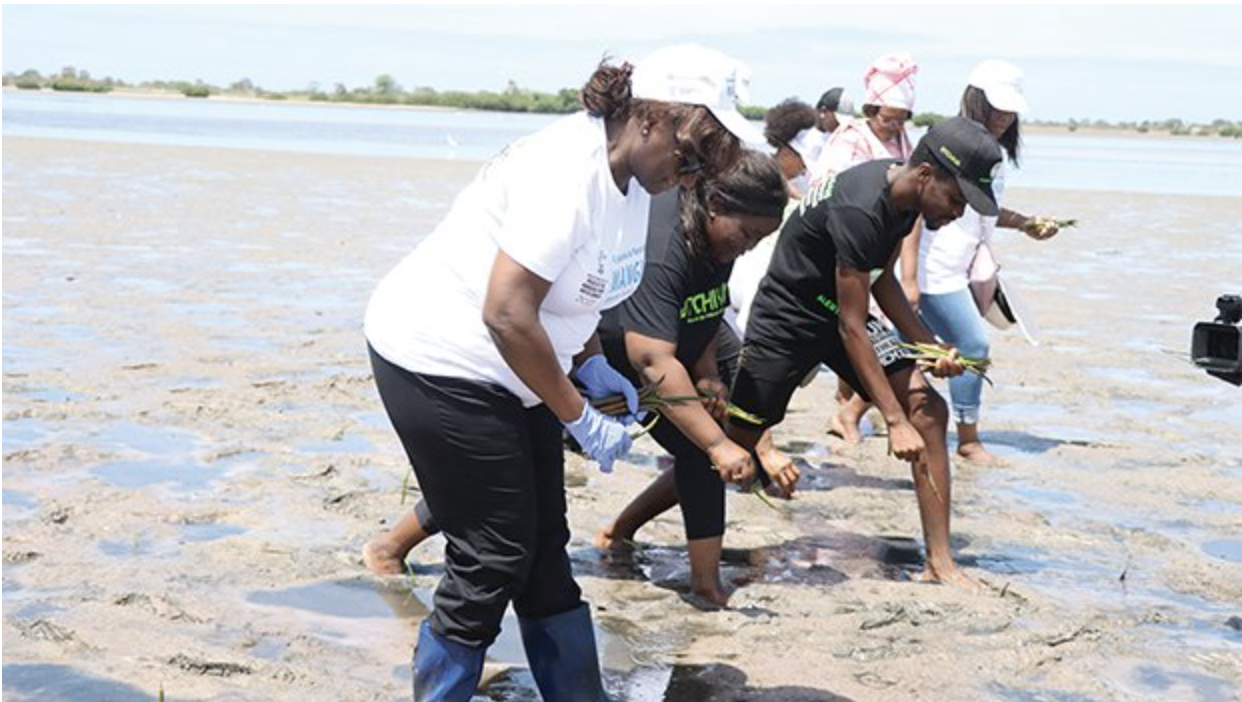Article on Jornal de Angola, 04.12.2022
by Pedro Bica
8,000 mangroves were planted yesterday in the Urban District of Ramiros, in Luanda, in connection with International Fisheries Day. The act was chaired by the Minister of Fisheries and Marine Resources, Carmem Sacramento Neto.

Carmem Sacramento Neto said that the act served to guarantee the protection of the national ecosystem
The project, an initiative of the Otchiva Association, aims to protect and conserve natural and tropical plant species located in coastal areas.
"With this action, we want to convey that we are concerned about the ecosystems and their maintenance so that they are healthy. Today we planted four boxes of mangroves, about one hectare, which is the target set for this area of Ramiros," said Carmem Neto.
The Minister added that the Executive is supporting the project by the NGO Otchiva, with support from ADPP Angola, which is responsible for the plant nurseries, from the Ministry of the Environment and from the Provincial Government of Luanda. According to the Minister, the Executive also intends to carry out reforestation in the provinces of Soyo, Nzeto and Cabinda, as these are areas with a higher incidence of mangroves.
She added that planting more mangroves helps preserve the coastline, as well as communities that rely on the coastline as a source of livelihood, such as fishermen.
The Minister of Fisheries took the opportunity to invite society to join the project.
Fernanda Renée, head of the Otchiva Association that aims to protect, conserve and restore mangrove ecosystems, said that the biggest concern has been coastal constructions. "The mangroves are under pressure from pollution, and the construction of houses, hotels and resorts on the coastline," adding that the Otchiva group is appealing to the Government not to give away land in these ecosystems.
The founding member of Otchiva said that Angola already has approximately two million mangroves planted along the coastline.
"We have mangroves all along the coastline, from Cabinda, Zaire, Bengo, Luanda and Benguela. The mangroves are being destroyed and Otchiva has been working to raise everyone's awareness for the benefit of this common good".
The mangroves are nurseries of marine life, where many species such as fish, crustaceans and molluscs live. It is the habitat of several migratory birds such as flamingos and pelicans, and are subsistence resource area for communities. Fishermen exploit marine resources in these areas.
Fernanda Renée advised that the mangroves are important for protecting the coastline, preventing flooding and erosion, and their forests absorb large amounts of carbon dioxide.
The Deputy Governor of Luanda Province, Gilson Carmelino, said that the Provincial Government (PGL) supports all activity related to the protection of mangroves and the ecosystem. "We will continue to work to prevent all activity and actions that are linked to the degradation of the mangroves."
"There is work to be done by PGL to regulate construction in coastal areas where there are mangroves. Through the administrations and districts, the Provincial Government has been working on supervision to ensure that licenses are issued the construction of buildings or dwellings in mangrove protection zones.”
Two million already planted
The coordinator of the mangrove reforestation project, Fernanda Renée revealed yesterday that since 2016 Angola has reached a total of 2 million mangroves already planted, throughout the coastal zone of the national territory.
The Mussulo Peninsula in Luanda, she said, uses the mangroves for various purposes, from the use of this ecosystem for fishing and for collecting crustaceans and molluscs. "The construction of salt flats and the exploitation of salt is carried out in a disorderly manner and its extension has put pressure on the mangrove ecosystems," she explained, “which harbour numerous species, form a subsistence zone for communities living here, and perform an important function along the coastline, whose forests sequester and store more carbon dioxide than any other forest.”
The destruction of this ecosystem, she revealed, results in the disappearance and extinction of many species, as well as the appearance of ocean swells that provoke flooding and environmental catastrophes. "The community must be educated and made aware about the importance of mangroves and the sustainable use of these marine ecosystems," she advised.


